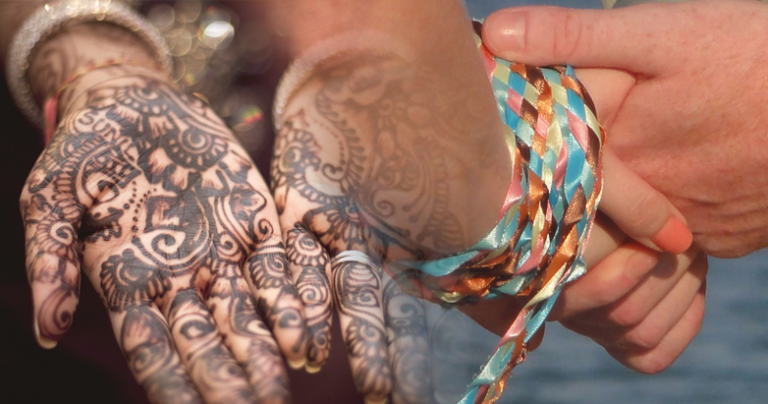Pagans in England and Wales should pay close attention to recent government proposals on Muslim marriages. There’s a chance they could result in Pagans who officiate handfastings and other Pagan weddings inadvertently breaking the law.

Handfastings, nikah and the law
Essentially, Islamic weddings (nikah) and Pagan weddings currently have exactly the same legal status in England and Wales. On their own, they do not constitute a legal marriage in any sense.
At present, the only religious weddings that have any inherent legal recognition are Anglican, Jewish and Religious Society of Friends (“Quaker”) weddings. All other religious weddings, including nikahs and handfastings, are only recognised in law if:
- They take place in a place of worship registered for religious marriage, in an approved format, or;
- A separate civil ceremony is also conducted before or after the religious ceremony (this tends to be the norm with Pagan weddings)
This generally doesn’t cause issues in the Pagan community, as far as I’m aware. Most Pagans appear to know that they need to get a civil marriage if they want their union to be legally recognised, and receive all the protections that marriage offers.
But this does cause issues in the Muslim community. Evidence suggests that many Muslims, and particularly Muslim women, are unaware that nikah are not recognised as legally-binding marriages in the UK, unless they take place at a mosque licensed for religious marriage. But nikah can be quite informal compared to weddings in other traditions. They often take place in people’s houses, which therefore means they have no legal meaning.
Muslim women who have recently migrated to the UK, and who may have no English skills, are particularly vulnerable to this confusion. Their country of origin may accept that nikah are legally-binding and they might not be aware that the laws are different in the UK. This means that they may find themselves “divorced” but entitled to no assets. If the woman in question doesn’t have her own source of income, this could leave her in a desperate situation. To compound matters, the process of “divorce” for a man in a traditional nikah is far simpler than for a woman.
In 2014, a study of 50 Muslim women in the West Midlands found that while 46 were in a nikah marriage, only 5 were in a legally-recognised civil marriage. Over half were unaware that they lacked the full legal rights and protections of civil marriage. 31 said that their partner had more than one “wife”.
Is legislation the answer?
This week, the government released its Integrated Communities Strategy Green Paper. The purpose of this paper is to “confront the segregation that can divide communities.” Among the many proposals set out in the paper to improve integration (which, incidentally, ignore the segregation that increased discrimination in faith schools will cause) is the following:
“The government is supportive in principle of the requirement that civil marriages are conducted before or at the same time as religious ceremonies. Therefore, the government will explore the legal and practical challenges of limited reform relating to the law on marriage and religious weddings.”
If I interpret this correctly, to try and solve the issue of Muslims entering into marriages that are not legally-binding, the government is proposing laws that could effectively mean it would be illegal to conduct a religious wedding without conducting a civil marriage beforehand or at the same time.
What would these laws mean for Muslims, Pagans and others?
I can see two possible ways these laws could be put into practice, and neither would be good for religious freedom:
- The law applies to Muslim marriages only. While this might indeed solve the issue of Muslim women getting exploited in non-legal nikah, it’s pretty clear that targeting Muslim marriages only would be discriminatory and would further marginalise an already marginalised community.
And that would only be the start of the problems. How would we define nikah? Would only particular types of nikah be considered? Would it only target Sunni and Shia Muslims, or would Ahmadiyya Muslims (who are themselves minorities in Islam) also be affected? - The law applies to ALL religious marriages. This would represent a massive incursion of the state upon religion, and would have an impact on all religions that aren’t Anglicanism, Judaism or the Religious Society of Friends. While the impact would be fairly minimal on religions that usually hold their wedding ceremonies in a place of worship registered for marriage, it would severely affect those whose weddings aren’t often held in this way. This includes Humanists, Hindus and of course, Pagans.
If the government were to go down the route of #2, and apply the law to all religious marriages, this would potentially put severe restrictions on the right of Pagans and others to practice their religion in the manner they wish. It would effectively be forcing all religions to adopt a traditional Christian model of marriage, i.e. that it is for life, and must also involve legal sharing of assets.
But both Muslim and Pagan religious marriages are quite different from this Christian model. Unlike the Christian institution of marriage, nikah are not necessarily meant to be for life. Nikah mut’ah and nikah misyar, for example, are designed to be temporary arrangements, that enable people to engage in intimate acts within Islamic tenets. Pagan unions too can be temporary. Pagans might decide to have a handfasting “for a year and a day,” or another set time limit, sometimes as a precursor to a long-term commitment which might also involve a civil wedding.
Another issue that affects both Muslim and Pagan weddings is that of polyamory. Both Muslims and Pagans may engage in polyamorous relationships that are commemorated by a religious ceremony; indeed, the priestess of one of my local moots even appeared on British TV holding a polyamorous handfasting. But polygamy, in which three people or more are married to each other and have shared ownership of assets, is not legal in the UK. Would new laws requiring religious marriages to all involve a legal aspect mean that polygamy also has to be legalised? Or would it mean that polyamorous religious marriages would have to be prohibited?
Finally, how could these laws be enforced? Considering that both Muslim and Pagan weddings can be held by anyone, and not necessarily a recognised “religious leader,” how could a government reasonably make sure all religious ceremonies of union involved a legal aspect? And how would you punish a Muslim or Pagan who held a religious wedding without ensuring a civil one was also conducted?
Some alternative solutions
Although I can see there is a real issue with Muslims entering into religious marriages without being fully aware of their rights (or lack thereof) that needs to be rectified, I do not agree with the government’s proposals to legally enforce those conducting nikah to ensure a civil marriage is also performed. I think this will mean far too much state intervention in the affairs of religion, the imposition of Christian values on to other religious traditions, laws that are virtually impossible to enforce consistently, and unnecessary restrictions on religious freedom and the ability of religious people to choose what kind of union they wish to enter.
So I’d like to propose some alternatives to the government’s authoritarian and punitive approach to the issue of Muslim marriages:
- A national campaign of education. As a priority, Muslim communities in the UK, and particularly women and those with limited English skills, should be educated on their rights as British citizens and residents. Information should be made available in community languages as well as English, and councils in areas with large Muslim populations should do more to reach out to these communities and make sure the necessary information is going to the right people.
But we need to think broader too. Marriage laws in England and Wales are so complex and confusing that there is widespread ignorance about the legalities of marriage among all communities, not just among recent migrants. Many British, for example, are unaware of the differences between religious and civil marriage, or the rights of cohabitees compared to the rights of a married couple. Citizenship education in the UK should include education about marriage. - Punishment for those who mislead individuals about marriage. If there’s any evidence that Muslim women, or anyone else, are being deliberately deceived about their rights in a religious marriage, this is clearly wrong and should be punished by law as fraud.
- A voluntary code of “best practice” for faith groups. While I do not believe the law should force religious groups to discuss legal issues regarding marriage, they should be strongly encouraged to take responsibility in ensuring the rights of those entering religious marriage are being protected. This applies not just to Muslims, but to Pagans and other groups as well. People conducted religious ceremonies should make sure the couple is aware that the ceremony itself isn’t legally-binding, and that the the laws of England and Wales will always take precedent over “laws” enforced by religious councils. They should also carefully consider the ethics and safeguarding aspects of who they bind in a religious ceremony if it involves vulnerable people.
- Complete separation of religious “marriage” from civil marriage. Part of the reason for the confusion about the laws of religious marriage is because marriage laws in England & Wales are themselves deeply confused, thanks to the overlapping roles of religion and state in the institution of marriage. As a secularist, I believe in the complete separation of church and state, and this should of course include marriage. All marriages should involve the same process and the same legal documentation, and no religious marriage of any sort should be automatically be considered legally-binding.
At the same time, the current law regarding marriages should be relaxed slightly, so that you do not need to get married in a registered building in order for it to be legal. The person officiating, the process followed, and the documentation signed should be the only things that determine whether a marriage is legally-binding or not, not the venue. At the same time, the current law that means civil weddings must not involve any sort of religious symbolism or invocations while the registrar is present should also be relaxed; the only areas where religions shouldn’t be involved is in the legally-binding wording of the registrar and the documents. Both of these changes would mean anyone could get legally married anywhere (within reason), and that it would actually be easier to incorporate a religious ceremony into a civil one. And it would give people far greater freedom to choose whether they just want a civil union, a religious union, or both.
Make your view heard!
What do you think? Do you agree that keeping Muslim, Pagan and other religious weddings apart from legal marriage is a good idea? Or do you disagree? Please leave your comments!
And if you live in the UK and feel particularly strongly on this issue, you can respond to the government consultation on the Integrated Communities Strategy Green Paper giving your views here.
You can also read more about the issue:
- Pagan Tama: Legally-Binding Handfastings – I do?
- National Secular Society: State recognition of Islamic nikah marriages is no way to empower Muslim women
- Law & Religion UK: The Integrated Communities Strategy Green Paper and sharia
- Law & Religion UK: Integration: seeing the bigger picture
- Aurat: Equal and Free? 50 Muslim Women’s Experiences of Marriage in Britain Today
















